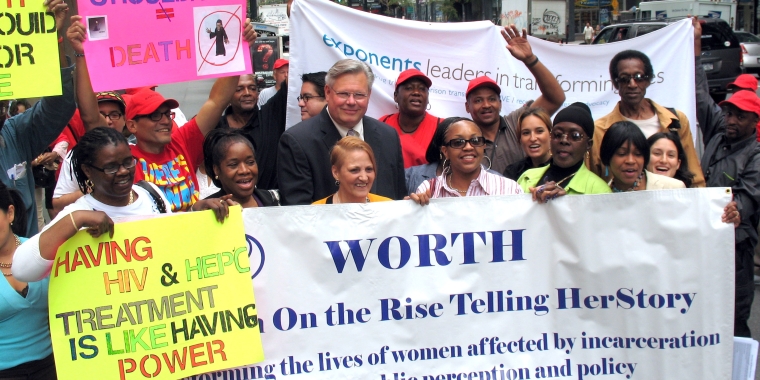
Urging Governor Paterson to Sign Legislation on Oversight of HIV, Hepatitis C Care in Prison
Thomas K. Duane
September 2, 2009
-
ISSUE:
- Health

HEALTH ORGANIZATIONS, ADVOCATES, FORMERLY INCARCERATED PEOPLE URGE GOVERNOR TO SIGN BILL TO HELP ELIMINATE DOUBLE STANDARD AND IMPROVE CRTICIAL HIV, HEPATITIS C SERVICES IN PRISONS AND JAILS
On Monday, August 31 at 9:30am, the Correctional Association of New York, the Women’s Initiative to Stop HIV/AIDS-New York (WISH-NY) of the Legal Action Center, Gay Men’s Health Crisis (GMHC), Latino Commission on AIDS, Women’s HIV Collaborative, and Women on the Rise Telling HerStory (WORTH) will co-host a rally and press conference across the street front of Governor Paterson’s office (630 3rd Ave between 40 and 41 Streets) in support of the Department of Health HIV/Hepatitis C Oversight Bill (S.3842/A.903). Passed unanimously by the legislature 43 days ago, S.3842/A.903 directs the State Department of Health (DOH) to oversee HIV and hepatitis C care in New York’s prisons and jails.
Bill sponsors Senator Thomas Duane and Assemblymember Richard Gottfried and bill co-sponsors Assembylmember Jeffrion Aubry and Senator Ruth Hassell-Thompson will address the crowd, along with formerly incarcerated individuals, and Dr. Lambert King, Director of Medicine, Queens Hospital Center and national expert on correctional health.
S.3842/A.903 takes a critical step toward rectifying a long-standing and problematic inconsistency in state health policy: while DOH monitors hospitals and clinics in the community, it does not oversee medical services in New York’s correctional facilities. Health facilities in prisons and jails are the only substantial public health institutions in the state exempt from mandatory, independent assessments by DOH. This inconsistency persists notwithstanding that almost 90,000 New Yorkers are in jail or prison at any one time and more than 300,000 cycle through the state’s prisons and jails each year.
S.3842/A.903 authorizes DOH to conduct annual reviews of HIV and hepatitis C care in state and local correctional facilities, to mandate necessary changes, and to publicly release annual reports on correctional care. New York has the largest number of HIV-positive incarcerated people and the second largest number of HIV-positive incarcerated women of all prison systems in the country. Over 97% of the state’s incarcerated population will eventually return to the community.
DOH’s AIDS Advisory Council strongly supports S.3842/A.903, stating in a recent letter: “[Our] conclusion is that there is a need for an outside monitor and the use of the same standards of care within the prisons as exist in other inpatient and ambulatory facilities throughout the state.”
Under S.3842/A.903, DOH would begin monitoring state prison care immediately and local jail care two years later. DOH estimates that oversight of HIV and hepatitis C care in the state prison system would cost $686,000 – a small price to pay considering the bill’s projected long-term cost savings and positive impact on individual and community health.
More than 12% of women and 6% of men in New York’s prisons are HIV-positive. About 16% of women and 11% of men entering prison in 2007 had hepatitis C. The general public’s rate of infection is 0.15% for HIV and 1.6% for hepatitis C. More than 100,000 people are admitted to local jails and about 27,000 to state prisons in New York each year. Nearly 60,000 people are incarcerated New York’s prisons, 4.5% of whom are women. About 30% of women and 20% of men in New York’s prisons are serving time for drug offenses. Almost 52% of New York’s prison population is African American, more than 25% are Latino, and just over 21% are white.
Senator Thomas Duane:
This is 2009. It is regrettable that we even have to have this discussion. New York’s correctional facilities continue to have one of the highest national rates of HIV and Hepatitis C infection. Yet the Department of Health (DOH) exercises little oversight as to how these two infections are monitored and treated within our prisons. As a result, inmates receive different, and too often an inconsistent, standard of care than other New Yorkers who are provided the protections of DOH oversight. This is wrong. The Governor must do the right thing and sign this bill into law.
Assemblyember Richard Gottfried:
The state prisons have about 60,000 inmates, and each year about 27,000 of them return to the community. Providing essential health care to this population is important to the well-being of them, their families, communities and the correctional staff. If this bill reduces the spread of HIV/AIDS or hepatitis C, or prevents advance of the disease to a stage where the patient is more infectious and more difficult and expensive to treat, even in a small fraction of cases, it will pay for itself many times over.
Assemblymember Jeffrion Aubry:
I’ve co-sponsored this bill for years because it will improve health outcomes in prison and in our communities, contribute to successful reentry, and allow New York to maximize the more than $360 million spent annually on prison medical services. Ultimately, better prison health care means healthier communities, enhanced community safety, and sustainable cost savings for the state.
Senator Ruth Hassell-Thompson:
In the last few years the Department of Correctional Services (DOCS) has made significant strides in improving their health delivery systems. Still, high-risk behaviors amongst incarcerated persons, and failure to have medical standards consistent with those outside of prisons has led to the increase of disease and infection amongst the incarcerated and non-incarcerated. The Department of Health (DOH) must have oversight over DOCS policies, and when necessary have the authority to correct deficiencies that are contrary to professional medical standards. Senator Duane’s bill will ensure that there is a more collaborative effort between DOCS and DOH and will put in place measures to prevent the spread of diseases and infections in all communities but especially in those communities that are grossly affected by incarceration.
Rusti Miller-Hill, Chair of the Positive Women’s Network of NY:
I didn’t see an HIV specialist throughout my entire time at this one correctional facility, not even after I had an allergic reaction to my HIV medication. At another facility I was transferred to I received good HIV care. Whether you receive quality treatment should not be the luck of the draw depending on which facility you end up serving time in.
Oscar López, Director of Health Policy, Latino Commission on AIDS:
People of color are disproportionately affected by HIV/AIDS and by incarceration. Nearly 16% of Latina women and almost 5% of Latino men entering prison in New York are HIV positive. The DOH HIV/Hepatitis C Oversight Bill will contribute to New York’s ongoing efforts to improve the health of thousands of people in prison, thousands more who are released each year, and still thousands more family and community members across the state. The Latino Commission on AIDS urges the Governor to sign this bill into law today.
Jack Beck, Prison Visiting Project Director, Correctional Association of New York:
Although state correctional officials have significantly improved HIV and hepatitis C care in recent years, there are still widespread inconsistencies in the quality of care at different prisons. Without regular assessment, the state can’t effectively identify which institutions need improvement or track progress. Effective prison healthcare is good public health policy and makes good financial sense.
Tracie M. Gardner, Director of New York State Policy and Coordinator of WISH-NY (Women's Initiative to Stop HIV) at the Legal Action Center:
We can no longer ignore the obvious: prison health care is community health care. The disproportionate impact of HIV and Hepatitis C infection in Black and Latino communities goes hand in hand with the high prevalence of these diseases in the prison. Nothing else correlates so strongly. We must support policy and programs that address these epidemics inside and outside to have any meaningful effect. To do otherwise is to consign these communities to the constant recycling of poor health.
Serena Alfieri, Women in Prison Project Associate Director of Policy, Correctional Association:
People who receive quality health services in prison are more likely to continue treatment after release and encourage family and friends to seek testing and care. They are also less likely to pass on illnesses to loved ones and to seek costly emergency services after incarceration. We urge the Governor to sign this bill and reverse a policy that is penny-wise and pound-foolish.
Tamar Kraft-Stolar, Women in Prison Project Director, Correctional Association:
This bill is particularly important for women. The rate of HIV among women in New York’s prisons is double that of men in prison and 80 times higher than the rate in the general public. By signing this bill, the Governor will help ensure that the state takes seriously its responsibility to oversee the quality HIV and hepatitis C care for all residents, both inside prison and out.
SOURCE: Correctional Association of New York and The Legal Action Center
Share this Article or Press Release
Newsroom
Go to NewsroomSenator Duane's Drill Watch
May 28, 2012
Edward S. Kirkland
May 18, 2012
